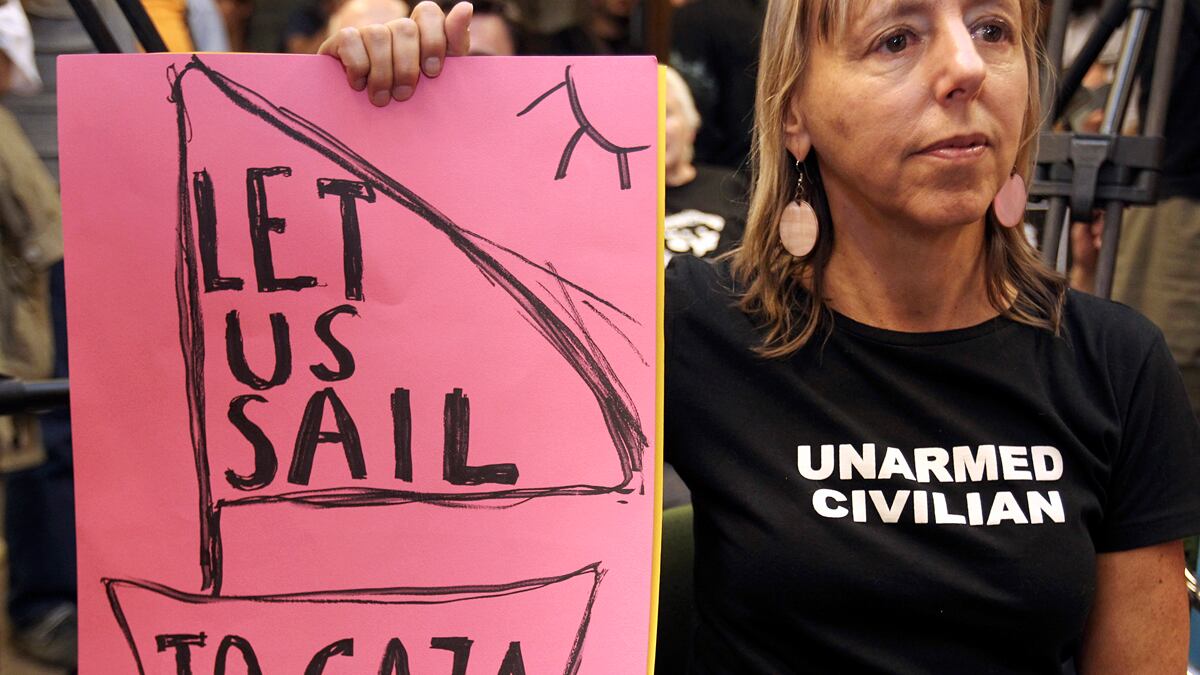In the coming days, pro-Palestinian activists will sail about 10 ships through the Mediterranean to the Gaza Strip, in a bid to break through Israel’s four-year-old blockade. The flotilla, carrying food and medicines to Gaza, is a reprise of an operation a year ago that prompted an Israeli raid and ended in the deaths of nine Turkish activists. Once again, Israel is vowing to intercept the ships. In trying to understand the brewing confrontation this time, it’s helpful to keep one thing in mind: The cargo that activists hope to deliver to Gaza in the coming days is beside the point. Palestinians don’t necessarily need it and Israel is not threatened by it.
That may sound counterintuitive. The activists, including Americans, sailing on a ship they’ve dubbed “The Audacity of Hope,” say they’re rushing the supplies to a population that has lived under siege for four years – since Hamas seized control there in 2007. True enough. But for the past year Israel has allowed Gazans to import just about anything they want (except building materials, which Israeli officials say can be used to make rockets). And whatever Palestinians can’t get from Israel, they bring in through a network of illegal tunnels linking them to neighboring Egypt. Free food and medicine certainly won’t go unused in Gaza, but they’re not an imperative.

Israel for its part says the blockade is aimed at preventing Hamas from importing weapons, including long-range rockets that might put the country’s biggest urban areas within striking range. At least three times in recent years, Israel has intercepted arms-laden ships en route from Iran to Gaza. But arms smuggling is done by secret operators in furtive voyages, not by groups with names like Code Pink on rickety ships with journalists on board. Even the Mavi Marmara, the Turkish ship whose passengers attacked Israeli frogmen with knives and clubs a year ago, had no guns in its cargo. In the raid on that ship, Israel ended up killing nine passengers, losing its warm relationship with Turkey, and suffering international condemnation.
So why would either side risk a repeat performance?
Like with so many other issues Israeli-Palestinian related, these actions are mainly to score points in the public relations battle. The activists are hoping to put a spotlight on the Gaza blockade by provoking another confrontation on the high seas. Israel wants to deflect attention from the siege policy by depicting the organizers as terrorists and their campaign as a mission to help arm Hamas. In recent days, Israel appears to have pressed even its vaunted spy agencies into the service of obstructing the other side. Flotilla organizers say someone sabotaged two of their ships currently docked in Greece.
For both sides, the uproar created by events like the flotilla operation tend to cloud the more germane issues. For Palestinians, the real impact of the siege has been on Gaza’s export market, which Israel has all but crushed by preventing farmers and manufacturers from sending their goods to the West Bank or to markets abroad. According to the Israeli rights group Gisha, which gathers data on Gaza’s economy, 83 percent of factories in the territory have either closed their doors or are working at 50 percent of capacity. Before the blockade, Israel had agreed to allow up to 400 trucks to cross the border every day. Now Gazans are lucky to get that many in a year. Since May, not a single item has moved across the border. Sari Bashi, the executive director of Gisha, says she would rather see activists organizing a flotilla to take goods out of Gaza rather than bringing supplies to the Strip.
For Israel, the tunnels linking Gaza and Egypt are a much bigger problem than any flotilla. Controlled by Hamas, they allow the group to ensure that weapons smuggled into Gaza end up solely in the hands of their militiamen and not the rival Fatah group. And by taxing all imports at the tunnels, the group has become richer and stronger in the past four years. According to Israel’s own estimate, Hamas has acquired its most sophisticated weaponry via the tunnels. Even some Israeli analysts now talk about the blockade as a failed policy.






